
Maria Goicoechea - PhD Student in Cancer Research at ICR, London
@goico13.bsky.social
Researcher investigating the intersections of cell death, immunity, and cancer biology, with a particular focus on the roles of transposable elements and RNA biology in disease processes @meierlabicr.bsky.social
Viral infections can wake up dormant breast cancer cells in the lung, driving metastasis
www.nature.com/articles/s41...
www.nature.com/articles/s41...

Respiratory viral infections awaken metastatic breast cancer cells in lungs - Nature
Mouse models show that respiratory infections from viruses such as influenza and SARS-CoV-2 can trigger metastasis of dormant breast cancer cells in the lungs, a finding supported by epidemiological data from two large human cohorts.
www.nature.com
September 26, 2025 at 9:32 AM
Viral infections can wake up dormant breast cancer cells in the lung, driving metastasis
www.nature.com/articles/s41...
www.nature.com/articles/s41...
Exciting new paper in Cancer Discovery: ecDNA drives spatial tumor evolution
aacrjournals.org/cancerdiscov...
aacrjournals.org/cancerdiscov...
Extrachromosomal DNA–Driven Oncogene Spatial Heterogeneity and Evolution in Glioblastoma
AbstractOncogenes amplified on extrachromosomal DNA (ecDNA) contribute to treatment resistance and poor survival across cancers. Currently, the spatiotemporal evolution of ecDNA remains poorly underst...
aacrjournals.org
September 8, 2025 at 10:23 PM
Exciting new paper in Cancer Discovery: ecDNA drives spatial tumor evolution
aacrjournals.org/cancerdiscov...
aacrjournals.org/cancerdiscov...
Reposted by Maria Goicoechea - PhD Student in Cancer Research at ICR, London
Regulation by RNAs might be even more extensive than we thought. Many enzymes and other proteins not previously considered as RNA-binding proteins do seem to fall into this class & might have their activity regulated by RNA.
www.cell.com/cell/fulltex...
www.cell.com/cell/fulltex...

Rethinking RNA-binding proteins: Riboregulation challenges prevailing views
The advent of system-wide proteomic approaches has largely expanded the number of
RNA-binding proteins (RBPs). This review discusses how recent discoveries are transforming
our understanding of biolog...
www.cell.com
September 5, 2025 at 3:49 PM
Regulation by RNAs might be even more extensive than we thought. Many enzymes and other proteins not previously considered as RNA-binding proteins do seem to fall into this class & might have their activity regulated by RNA.
www.cell.com/cell/fulltex...
www.cell.com/cell/fulltex...
Reposted by Maria Goicoechea - PhD Student in Cancer Research at ICR, London
#GlycoPower! @vijayrathinam.bsky.social
@raflynn5.bsky.social @vinnieviruses.bsky.social &co show @nature.com that N-glycosylation of host small-RNAs present at cell surface prevents immune recognition by TLR3 and TLR7 upon apoptotic cells uptake avoiding autoinflammation!
@raflynn5.bsky.social @vinnieviruses.bsky.social &co show @nature.com that N-glycosylation of host small-RNAs present at cell surface prevents immune recognition by TLR3 and TLR7 upon apoptotic cells uptake avoiding autoinflammation!
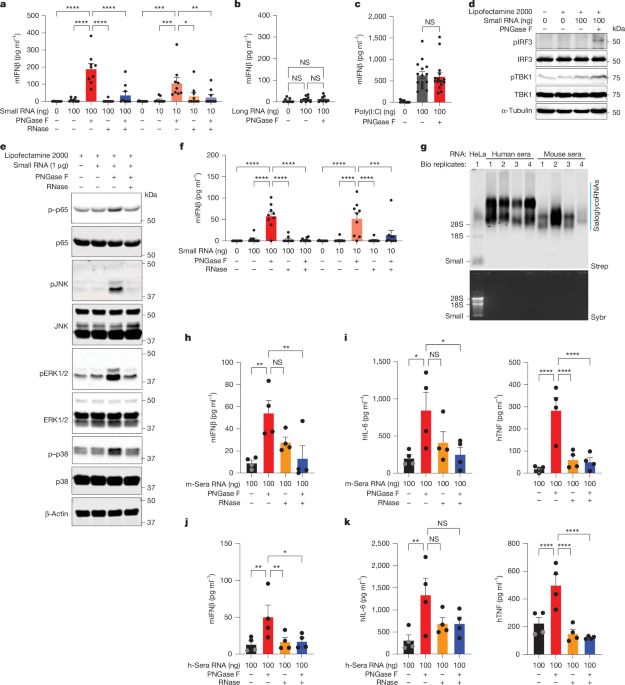
RNA N-glycosylation enables immune evasion and homeostatic efferocytosis - Nature
N-glycans on glycoRNAs prevent innate immune sensing of endogenous small RNAs, and the natural mechanism they use demonstrates how glycoRNAs exist on the cell surface and in the endosomal network with...
www.nature.com
August 6, 2025 at 10:12 PM
#GlycoPower! @vijayrathinam.bsky.social
@raflynn5.bsky.social @vinnieviruses.bsky.social &co show @nature.com that N-glycosylation of host small-RNAs present at cell surface prevents immune recognition by TLR3 and TLR7 upon apoptotic cells uptake avoiding autoinflammation!
@raflynn5.bsky.social @vinnieviruses.bsky.social &co show @nature.com that N-glycosylation of host small-RNAs present at cell surface prevents immune recognition by TLR3 and TLR7 upon apoptotic cells uptake avoiding autoinflammation!
Thrilled to present my research at the 2024-25 Annual ICR Conference! And deeply grateful to receive an Oral Presentation prize! Huge thanks to the whole @meierlabicr.bsky.social, organizers, and brilliant colleagues for the inspiration. Onward! 🚀 #ICR2025 #Research #Science



June 29, 2025 at 11:05 PM
Thrilled to present my research at the 2024-25 Annual ICR Conference! And deeply grateful to receive an Oral Presentation prize! Huge thanks to the whole @meierlabicr.bsky.social, organizers, and brilliant colleagues for the inspiration. Onward! 🚀 #ICR2025 #Research #Science
SP140 lowers IFN-β by switching off RESIST (a newly found mRNA stabilizer) and stalls gamma-herpesvirus. Dual antiviral punch!
www.nature.com/articles/s41...
www.nature.com/articles/s41...

SP140–RESIST pathway regulates interferon mRNA stability and antiviral immunity - Nature
The antiviral protein SP140 negatively regulates Ifnb1 mRNA stability by directly repressing the expression of the immune regulator RESIST.
www.nature.com
June 14, 2025 at 4:41 PM
SP140 lowers IFN-β by switching off RESIST (a newly found mRNA stabilizer) and stalls gamma-herpesvirus. Dual antiviral punch!
www.nature.com/articles/s41...
www.nature.com/articles/s41...
Just out in Nature Comms! Palbociclib in combination with virotherapy amplify ER stress and immune activation.
www.nature.com/articles/s41...
www.nature.com/articles/s41...
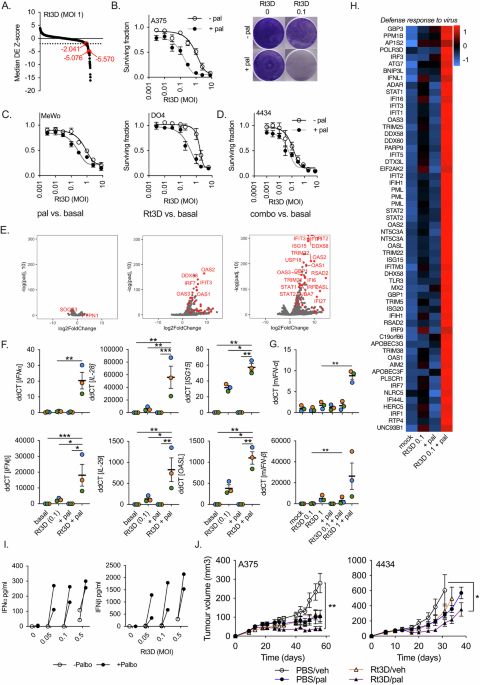
Palbociclib and dsRNA sensor co-operate to enhance anti-cancer effects through ER stress and modulation of immune evasion - Nature Communications
Pattern recognition receptors (PRR) critically modulate innate immunity. Here the authors show in cancer cells that interferon responses and anti-tumor immunity activated by dsRNA-induced PRR signalin...
www.nature.com
May 28, 2025 at 1:30 PM
Just out in Nature Comms! Palbociclib in combination with virotherapy amplify ER stress and immune activation.
www.nature.com/articles/s41...
www.nature.com/articles/s41...
Cancer cells transfer mitochondria with mutated mtDNA to tumor-infiltrating T cells, impairing their function and promoting immune escape. Awesome work!
www.nature.com/articles/s41...
www.nature.com/articles/s41...

Immune evasion through mitochondrial transfer in the tumour microenvironment - Nature
Mitochondria with mutations in their DNA from cancer cells can be transferred to T cells in the tumour microenvironment, which leads to T cell dysfunction and impaired antitumour immunity.
www.nature.com
January 23, 2025 at 11:36 AM
Cancer cells transfer mitochondria with mutated mtDNA to tumor-infiltrating T cells, impairing their function and promoting immune escape. Awesome work!
www.nature.com/articles/s41...
www.nature.com/articles/s41...
Delivery of cytosolic bacterial pathogens elicits anti-tumor responses via actiavtion of TLR pathway.
www.sciencedirect.com/science/arti...
www.sciencedirect.com/science/arti...

Cytosolic bacterial pathogens activate TLR pathways in tumors that synergistically enhance STING agonist cancer therapies
Intracellular bacterial pathogens are distinctive tools for fighting cancer, as they can proliferate in tumors and deliver therapeutic payloads to the…
www.sciencedirect.com
January 7, 2025 at 11:00 AM
Delivery of cytosolic bacterial pathogens elicits anti-tumor responses via actiavtion of TLR pathway.
www.sciencedirect.com/science/arti...
www.sciencedirect.com/science/arti...
Exonization of transposons leads to the formation of new protein-coding sequences, potentially impacting immune regulatory pathways.
www.cell.com/molecular-ce...
www.cell.com/molecular-ce...
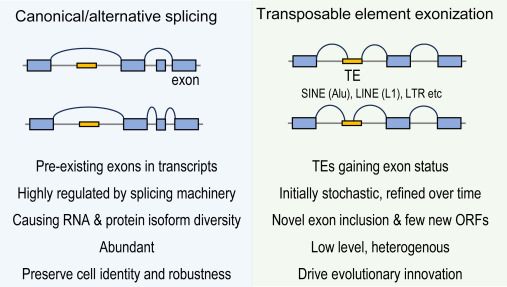
Transposon exonization generates new protein-coding sequences
In a recent issue of Cell, Arribas et al. and Pasquesi et al. explore the phenomenon of transposable element (TE) exonization and its impact on proteomic and immune diversity, highlighting its potential role as a driver of evolutionary innovation.
www.cell.com
January 6, 2025 at 10:50 PM
Exonization of transposons leads to the formation of new protein-coding sequences, potentially impacting immune regulatory pathways.
www.cell.com/molecular-ce...
www.cell.com/molecular-ce...
Chromosome missegration activates dsRNA-sensing pathway in a MAVS-dependent manner and enhances innate immune signaling!
www.cell.com/molecular-ce...
www.cell.com/molecular-ce...

RNA sensing induced by chromosome missegregation augments anti-tumor immunity
Sasaki et al. demonstrate that chromosome missegregation induced by SAC inhibition results in cytoplasmic dsRNA accumulation, primarily generated from non-exonic regions in the MNs. Activation of MAVS-mediated dsRNA sensing cooperates with dsDNA sensing to promote anti-tumor immunity.
www.cell.com
January 1, 2025 at 7:30 PM
Chromosome missegration activates dsRNA-sensing pathway in a MAVS-dependent manner and enhances innate immune signaling!
www.cell.com/molecular-ce...
www.cell.com/molecular-ce...
Reposted by Maria Goicoechea - PhD Student in Cancer Research at ICR, London
A new study in @cellpress.bsky.social Immunity from the lab of Dr. Benjamin Greenbaum provides insights into how #PancreaticCancer cells accommodate active retrotransposons without triggering the innate immune response. #oncsky #medsky
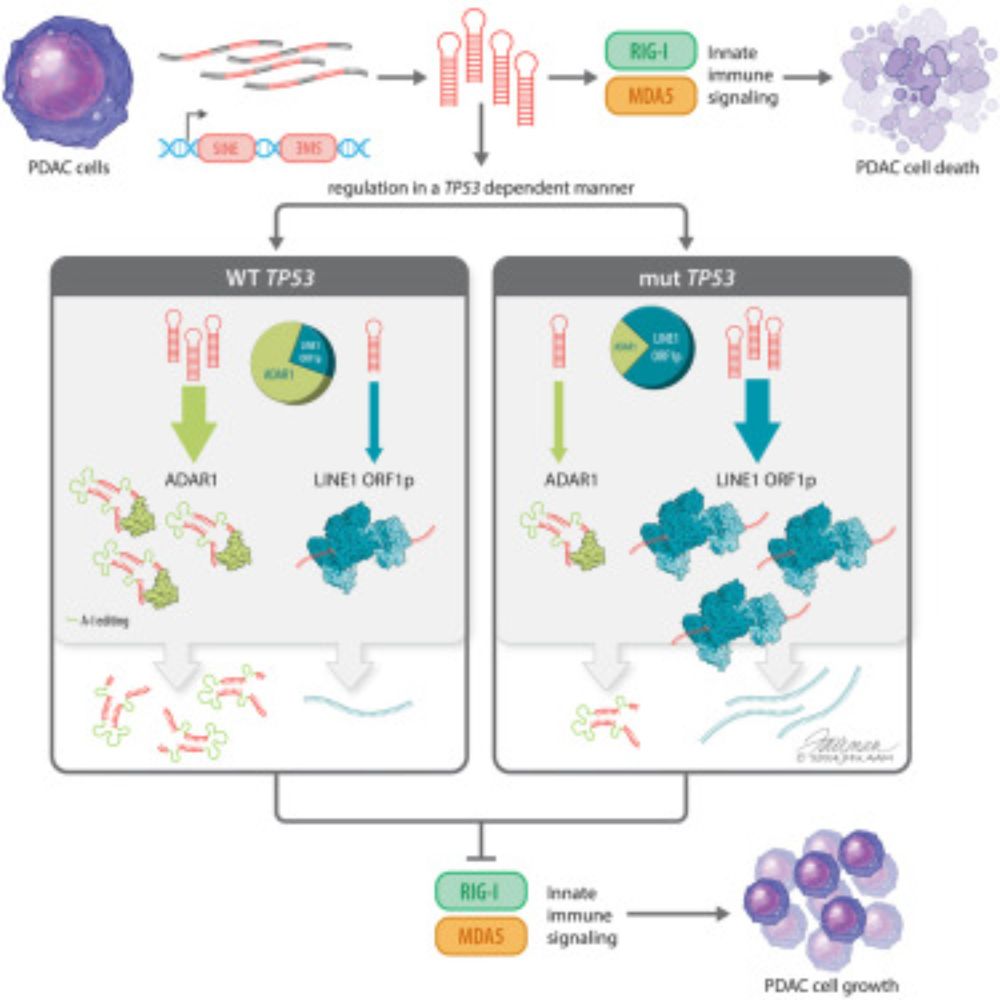
Cancer cells restrict immunogenicity of retrotransposon expression via distinct mechanisms
Overexpression of transposable elements is a common feature of cancer. Sun, You, et al.
show that, in pancreatic ductal adenocarcinoma, tumor cells adapt through different
mechanisms to mitigate a spe...
www.cell.com
November 27, 2024 at 6:57 PM
A new study in @cellpress.bsky.social Immunity from the lab of Dr. Benjamin Greenbaum provides insights into how #PancreaticCancer cells accommodate active retrotransposons without triggering the innate immune response. #oncsky #medsky
Reposted by Maria Goicoechea - PhD Student in Cancer Research at ICR, London
Insights by Erika Valeri and @kajastelab.bsky.social: Two works by Chan et al. (https://buff.ly/3D66PfJ) and Ru et al. (https://buff.ly/49or5Fo) identify defective RNA processing as the root cause of impaired antiviral immunity against #SARSCoV2 in the human brainstem: https://buff.ly/4g74MXy

December 6, 2024 at 6:19 PM
Insights by Erika Valeri and @kajastelab.bsky.social: Two works by Chan et al. (https://buff.ly/3D66PfJ) and Ru et al. (https://buff.ly/49or5Fo) identify defective RNA processing as the root cause of impaired antiviral immunity against #SARSCoV2 in the human brainstem: https://buff.ly/4g74MXy
Reposted by Maria Goicoechea - PhD Student in Cancer Research at ICR, London
Best #Nikolaus 🎅! Our paper on how the 🫁 microenvironment can shape #innate immunity against #viruses is out @sciimmunology.bsky.social This was a herculean effort brilliantly led by @pauljbaker.bsky.social who singlehandedly established the model in the lab during the pandemic. 🧪 #Immunosky 1/9
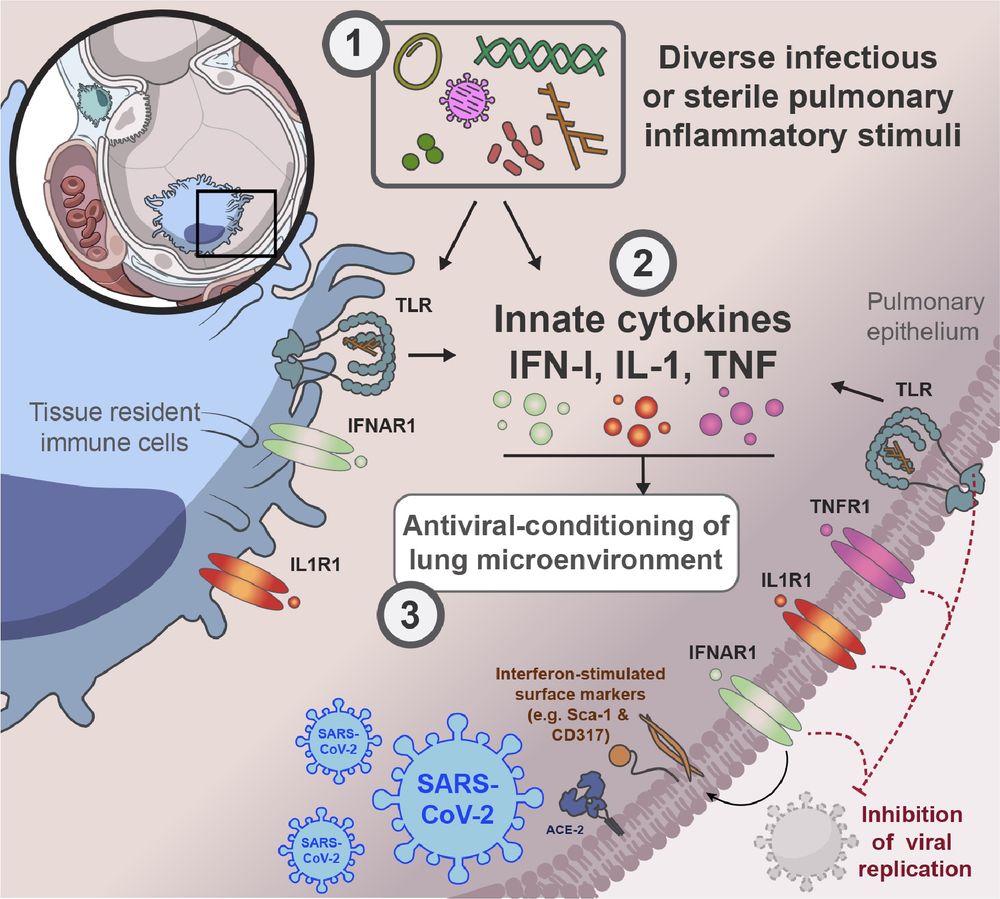
December 6, 2024 at 10:38 PM
Best #Nikolaus 🎅! Our paper on how the 🫁 microenvironment can shape #innate immunity against #viruses is out @sciimmunology.bsky.social This was a herculean effort brilliantly led by @pauljbaker.bsky.social who singlehandedly established the model in the lab during the pandemic. 🧪 #Immunosky 1/9
Reposted by Maria Goicoechea - PhD Student in Cancer Research at ICR, London
The HuSH complex silences retrotransposable elements. We identify HuSH2, centered on TASOR2, targeting KRAB-ZNFs and interferon genes, balancing retrotransposon silencing and immune regulation. www.nature.com/articles/s41...
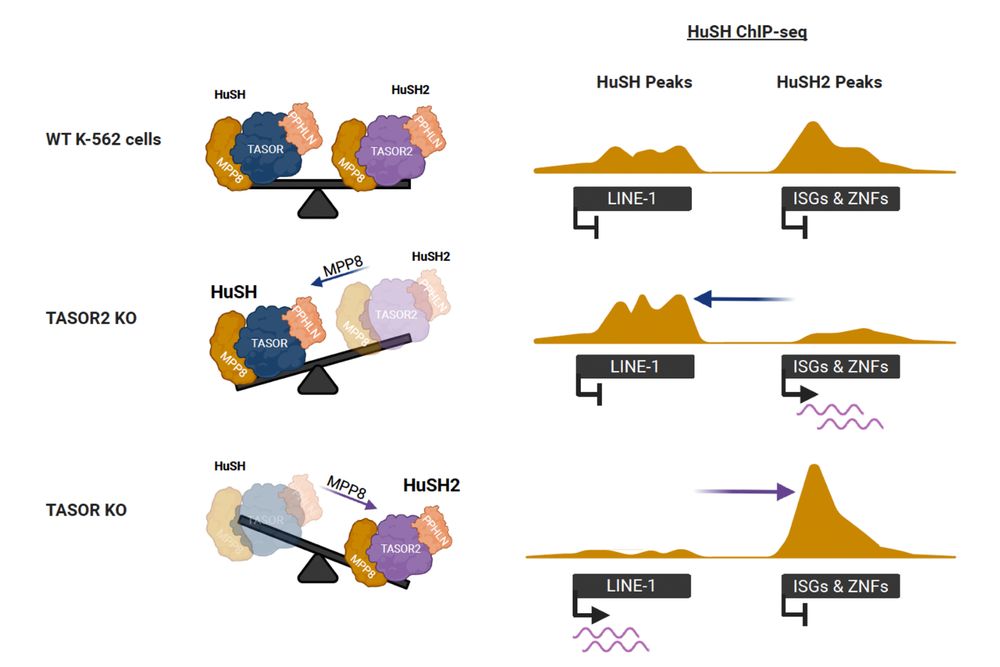
November 3, 2024 at 3:20 PM
The HuSH complex silences retrotransposable elements. We identify HuSH2, centered on TASOR2, targeting KRAB-ZNFs and interferon genes, balancing retrotransposon silencing and immune regulation. www.nature.com/articles/s41...
Blocking IRE1α enables RNA accumulation, triggering ZBP1-driven cell death and making cold TNBC tumors ICI-sensitive!
www.cell.com/cell/fulltex...
www.cell.com/cell/fulltex...

IRE1α silences dsRNA to prevent taxane-induced pyroptosis in triple-negative breast cancer
Mechanisms dictating the form of chemotherapy-induced cancer cell death are elusive.
This study reports that immunologically cold triple-negative breast cancer (TNBC)
hijacks an ancient ER stress resp...
www.cell.com
November 26, 2024 at 5:50 PM
Blocking IRE1α enables RNA accumulation, triggering ZBP1-driven cell death and making cold TNBC tumors ICI-sensitive!
www.cell.com/cell/fulltex...
www.cell.com/cell/fulltex...


